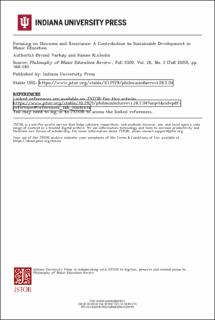Focusing on Slowness and Resistance: A Contribution to Sustainable Development in Music Education
Journal article, Peer reviewed
Published version
Permanent lenke
https://hdl.handle.net/10642/9827Utgivelsesdato
2020Metadata
Vis full innførselSamlinger
Originalversjon
Varkøy ØR, Rinholm H. Focusing on Slowness and Resistance: A Contribution to Sustainable Development in Music Education. Philosophy of Music Education Review. 2020;28(2):168-185 https://doi.org/10.2979/philmusieducrevi.28.2.04Sammendrag
This essay reflects on the values of slowness and resistance as fundamental ideas directly opposed to modern culture’s ideals of effectiveness and smoothness and discusses how music from the Western classical music tradition can offer such values in music education. At the same time, how we listen to music is highlighted as equally important as what we listen to. Values like slowness and resistance are seen as important critical ideas, not only in the bubble of aesthetics, music, and music education, but also in general discussions of consumeristic modern culture, characterized by unsustainable ideas of constant action and economic growth. Slowness and resistance in musical experience is argued to be important in forming the future of music education for sustainable development. The Korean-born German philosopher of art and cultural theorist Byung-Chul Han’s discussion of the concept of beauty, is central for the ongoing reflections in the essay. Martin Heidegger’s aesthetics of unveiling, and Hannah Arendt’s concept of vita contemplativa, as well as music of the Estonian composer Arvo Pärt and the Icelandic singer Björk, are also involved in the discussion.
